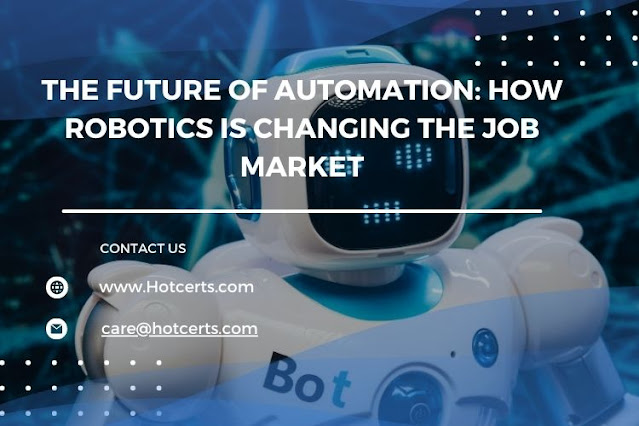The Future of Automation: How Robotics is Changing the Job Market
Introduction
Automation and robotics have become increasingly prevalent in our modern society, revolutionizing various industries and transforming the job market. With advancements in technology, robots and automated systems are now capable of performing tasks that were once exclusively reserved for humans. In this article, we will explore the future of automation and how robotics is reshaping the job market.
The Impact of Automation on Job Market
Automation has significantly impacted the job market by replacing routine and repetitive tasks traditionally performed by humans. Tasks such as data entry, assembly line operations, and customer service are now being automated, leading to increased efficiency and productivity. While automation offers numerous benefits, it also raises concerns about the potential displacement of workers and the changing dynamics of employment.
The automation of certain tasks can lead to positive consequences, such as the reduction of human error, improved safety conditions, and increased productivity. However, it can also have negative consequences, including job losses and unemployment. Industries such as manufacturing, retail, transportation, and customer service have experienced significant changes due to automation.
Upskilling and Reskilling for the Future
In the age of automation, continuous learning and skills development are crucial for individuals to remain competitive in the job market. Upskilling and reskilling programs play a vital role in equipping workers with the necessary skills to adapt to technological advancements. By acquiring new skills, individuals can enhance their employability and embrace the opportunities presented by automation.
The benefits of upskilling and reskilling extend beyond job security. Learning new skills can lead to personal growth, increased job satisfaction, and the ability to explore new career paths. Employers also benefit from a skilled workforce that can adapt to changing technologies and contribute to innovation.
The Role of Robotics in the Job Market
Robotics has played a significant role in driving automation and transforming the job market. Robots are capable of performing complex tasks with precision and speed, leading to increased efficiency and productivity in various industries. With advancements in robotics, collaborative robots, also known as cobots, are now being introduced into the workforce. These cobots can work alongside humans, assisting in tasks that require both human dexterity and robotic precision.
The integration of robotics in the job market opens up new opportunities and creates jobs that require expertise in robotics maintenance, programming, and operation. As industries embrace automation, there is a growing demand for skilled professionals who can design, develop, and manage robotic systems. This creates a shift in the job market, where individuals with a background in robotics can find exciting and rewarding career paths.
Automation and Job Market Disruptions
The rise of automation brings concerns about potential job displacements and unemployment. As tasks become automated, some jobs may no longer require human involvement, leading to workforce disruptions. However, it is essential to recognize that automation also creates new jobs and shifts the focus towards higher-value tasks that require human ingenuity, creativity, and critical thinking.
Addressing the challenges of job market disruptions requires a proactive approach. Governments, educational institutions, and businesses need to collaborate to provide support and resources for workers affected by automation. This includes offering retraining programs, career counseling, and financial assistance to help individuals transition into new roles and industries.
Embracing Automation for Economic Growth
Automation is not only changing the job market but also serving as a catalyst for economic growth. By streamlining processes, reducing costs, and improving efficiency, automation enhances the competitiveness of businesses. Increased productivity allows companies to allocate resources more effectively and invest in innovation and expansion.
Furthermore, the adoption of automation is not limited to a specific sector. Industries such as healthcare, agriculture, logistics, and finance are also embracing automation to optimize operations and improve outcomes. This widespread integration of automation across industries contributes to overall economic development and drives technological advancements.
Ethical Considerations of Automation
While the benefits of automation are significant, it is essential to consider the ethical implications associated with its implementation. Automation should not compromise human dignity or lead to the devaluation of human work. It is crucial to ensure that automation systems are designed with fairness, transparency, and accountability in mind.
Avoiding bias in automation systems is another critical ethical consideration. Care must be taken to prevent algorithms or robotic systems from perpetuating discrimination or favoring certain groups. By prioritizing ethical principles and human values, we can strike a balance between automation and the well-being of individuals and society as a whole.
The Future of Automation and Job Market
The future of automation holds great potential for both challenges and opportunities. Emerging technologies such as artificial intelligence, machine learning, and robotics will continue to shape the job market. While certain jobs may become automated, new roles will emerge, requiring skills in areas such as data analysis, cybersecurity, and human-robot interaction.
Adapting to the changing job market requires a mindset of continuous learning and flexibility. Individuals need to embrace lifelong learning, acquiring new skills that align with the evolving needs of the job market. Businesses must also prioritize innovation and stay agile to leverage the benefits of automation while ensuring the well-being of their workforce.
Conclusion
The future of automation and robotics will undoubtedly reshape the job market as we know it. While automation brings both benefits and challenges, it is essential to view it as an opportunity for growth and development. By upskilling, reskilling, and embracing technological advancements, individuals and businesses can thrive in an automated world.
As automation continues to advance, it is crucial to prioritize ethical considerations, ensuring that automation systems are fair, unbiased, and aligned with human values. By doing so, we can create a future where automation and human ingenuity coexist harmoniously, driving innovation, economic growth, and a better quality of life


.jpg)
Comments
Post a Comment